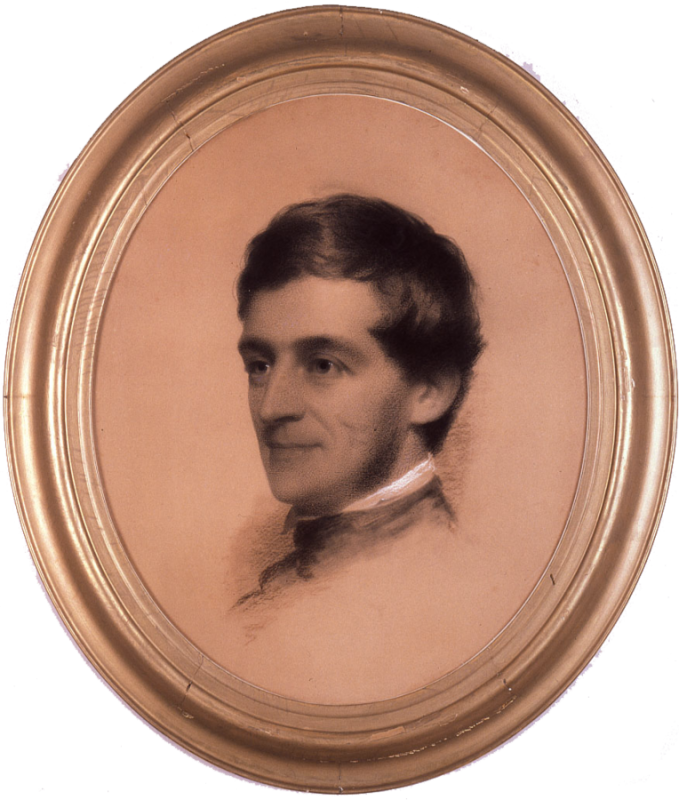Can anyone confirm this story? I’m talking about the one where Thoreau is in the local jail, having refused to pay his poll tax, and Emerson happens to walk by. “What are you doing in there, Henry?” Emerson calls through the window. “Ralph, what are you doing out there?” Thoreau replies.
How could this story not be apocryphal? It delivers too neat a package. Thoreau didn’t pay his tax because he objected to the war on Mexico. With his act, he provides posterity a model of non-violent social protest. Emerson’s program, which Thoreau knew well, was to change the collective psyche through a transformation of one’s own mind. Here, he’s called out as a quietist, despite all his brilliant philosophy. It’s a version of an old argument, paradigm shift versus piecemeal reform.
This is more or less the way Emerson framed it, anyway, in an essay of his called “New England Reformers.” It isn’t about Thoreau’s arrest—it was written several years prior to that. It also isn’t included in Volume 1 of Hollinger’s and Capper’s The American Intellectual Tradition, the reader contributors to this blog have been posting about these past few weeks. But the question was posed, what’s your favorite Emerson essay, and “New England Reformers” is one of my favorites.
I like that it begins with some journalism. Emerson reports on the “great activity of thought and experimenting” that had been going on in his part of the world for “the last twenty-five years.” People have been agitated, he tells us. They’ve challenged conventions, joined groups, adopted beliefs, and taken up causes. Whitman-like, Emerson catalogues the “ultraists,” the “seekers,” the abolitionists and socialists, “the temperance and anti-resistance societies,” all the “soldiery of dissent.” “What a fertility of projects for the salvation of the world!”
This is an Emerson I can enjoy, not getting in some philosophical weeds, but writing about what he’s seen and heard with his own eyes and ears. He keeps the tone light as he surveys all the circles of moral concern in their seemingly ever-widening variety. “Even the insect world was to be defended,” Emerson observes, “and a society for the protection of ground-worms, slugs, and mosquitos was to be incorporated without delay.”
Of course historians have a name for the “spirit of protest and detachment” Emerson is reporting on here—the Second Great Awakening, broadly understood, the age of Romantic Reform. Emerson is amused but not dismissive, sympathetic even when things threaten to get out of hand. “No doubt there was plentiful vaporing,” he concedes. “But in each one of these movements emerged a good result, a tendency to the adoption of simpler methods, and an assertion of the sufficiency of the private man.”
Maybe it was because Tom Wolfe died last week but re-reading “New England Reformers” brought Wolfe to mind, and in particular his book, The Electric Kool-Aid Acid Test. As Emerson before him, Wolfe was reporting on an age of agitation, of “plentiful vaporing,” of heightened sensitivity to the need for change and of acting out on that need. Some have gone as far as to claim that the movement Wolfe was reporting on, in this book and in other articles of the New Journalism, was in fact a Third Great Awakening in its last years of decay. Like Emerson’s, Wolfe’s tone is amused but indulging. Both writers have a showy style. Both made their livings from their writing, and so both had a pecuniary interest, let’s say, in pleasing their audiences. Of course all writers must concede in countless ways to reader demands and expectations, but there’s no denying that the calculations change when an audience’s pleasure relates directly to the writer’s bottom line.

1846 Portrait of Emerson by Eastman Johnson.
This may be a clue as to why I enjoy “New England Reformers.” Hearing Emerson report on his times, I can hear him better, too, in his context. He delivered this essay to the Society at Amory Hall on March 3, 1844, and so many of its lines sound great read aloud. “What [man] most wishes is to be lifted to some higher platform so that he may see beyond his present fear the transalpine good, so that his fear, his coldness, his custom may be broken up like fragments of ice and carried away in the great stream of goodwill.” Emerson tells his audience they want a higher platform, and then he lifts them up onto it. “We desire to be made great, we desire to be touched with that fire which shall command this ice to stream, and make our existence a benefit.”
Well, this is inspiring. This rings true. “Our existence a benefit” to others, he means—to existence, itself. In terms of the argument mentioned above, Emerson isn’t referring to a particular issue, some mere “partiality,” as he calls it. He’s speaking to paradigm. To propose that we desire more to serve than be served flies up in opposition to the eco-socio-cultural thinking that frames practically all our everyday American behaviors. Unless that paradigm is changed so that all behaviors that flow from it will, in turn, radiate re-framing, it’s hard to imagine much of anything really changing.
Emerson inspires, but he also disturbs. Our desire to “live on a higher platform” also means we seek to be “confuted.” Paradigm change occurs within a disturbed space. “We crave a sense of reality though it comes in strokes of pain.” I can see Emerson’s audience in Amory Hall shifting in their seats. Have I responded properly to this agitated age? Am I doing enough?
Other than partiality, Emerson’s problem with the reformers is “their reliance on Association.” Disturbed by injustices and innumerable disparities, seeing that they couldn’t carry off a revolution on their own, “they relied on new concert.” But no, Emerson says, our actions must not be in imitation of each other’s. They should arise from our individual genius. We are each of us to be our own Coltranes, he seems to say, blowing some never-heard-before solo, chorus after chorus, night after night.
Yet Emerson knows his audience. Where he disturbs, he must also restore. To act on individual genius is to “fall into divine circuits,” to acknowledge the “high” prevailing will, to tend to “our own orbit,” and to settle “into serenity.”
I don’t know. If I were in that room listening to Emerson, I might go home relieved I don’t need to worry about the insects, after all. Maybe I don’t have to join a group or put my name and email on a petition.

“They relied on new concert.” Austin, TX, January, 2017.
Reports suggest that since January of 2017, a great number of Americans have shown up at more meetings, taken part in more marches, and basically participated in more acts of political protest than they did in all their lives before. I’m one of them. I’ve heard many veteran activists speak in the past fifteen months or so, and they all say the same thing. Get together. Organize.
There may have been a time an introvert like myself would have smiled on the following sentence from “New England Reformers”: “The union is only perfect when we the united are isolated.” Now–and by now I mean today’s perilous moment–I’m impatient and annoyed. Ralph, what are you doing out there?

One Thought on this Post
S-USIH Comment Policy
We ask that those who participate in the discussions generated in the Comments section do so with the same decorum as they would in any other academic setting or context. Since the USIH bloggers write under our real names, we would prefer that our commenters also identify themselves by their real name. As our primary goal is to stimulate and engage in fruitful and productive discussion, ad hominem attacks (personal or professional), unnecessary insults, and/or mean-spiritedness have no place in the USIH Blog’s Comments section. Therefore, we reserve the right to remove any comments that contain any of the above and/or are not intended to further the discussion of the topic of the post. We welcome suggestions for corrections to any of our posts. As the official blog of the Society of US Intellectual History, we hope to foster a diverse community of scholars and readers who engage with one another in discussions of US intellectual history, broadly understood.
Anthony, thank you for this post. I have to admit, “New England Reformers” would not have been one of my picks for a favorite. But you have sold me on it.
I do like this line of yours as much as anything of Emerson’s: “Where he disturbs, he must also restore.” That is the pastoral sense coming through — in Emerson, sure, but equally in you.